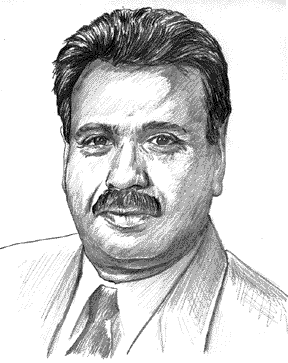INTERVIEW
Following The Road Map Of The Market
Moe Ansari Of Compak Trading
by Bruce Faber
Discipline and determination are key to succeeding as a trader, or anything else, for that matter. Moe Ansari of Compak Trading started off his college years as an architecture major before he discovered his true calling in the financial markets, only to be told he couldn't make it as a broker. He not only proved that prediction wrong, he proved it very wrong. Despite being told that his accent was too thick for him to be understood clearly, he went on to become a radio personality with a nationally syndicated weekend program covering the markets as well as doing daily market wrapups. Along the way, Ansari also started to conduct workshops around the country, teaching technical analysis and, as he observes, giving the participants "the proper tools" and guiding them toward their own system and methodology, with an emphasis on keeping their money with proper money management techniques. STOCKS & COMMODITIES Staff Writer Bruce Faber interviewed Ansari via telephone on June 22 and June 28, 1999, asking him about exit strategies, what we need to succeed in today's markets and why in his opinion investors will drift toward commodities.

ILLUSTRATION BY CARL GREEN
So how did you get started in this business?
I was a student at Fullerton College as an architecture major. One day, my roommate and I went to visit someone he knew who owned a commodity trading firm, Hoffman-Kavanaugh. We went, and the thing I'll never forget was the series of clocks on the wall -- you know, one with New York time, another with Chicago time, and London, and Tokyo. People were just running back and forth, and all these telephones were ringing. That was it. I decided that was what I wanted to do, right then and there.
So you went from building to brokerage, just like that?
Not quite. I was advised that my accent was too thick and it was too difficult to understand me, so I should stick to architecture. Well, being young, naive, or stupid, or a combination thereof, I decided that no, this was what I wanted to do. So I went and passed the brokers' exam and then started working for that company. That's how I started. In 1981, I left there and started my own firm. I left that partnership in the late 1980s, and in 1989, I started Compak Trading Co. That's what I've been doing since.
You had some other relationships in the industry along the way, didn't you?
Yes. In the late 1980s and early 1990s, I was in partnership with Steve Moore in what is now Moore Research. It was very exciting, because seasonality at that point was something that, relative to today, didn't have much research devoted to it. I found I didn't really enjoy the publications business, so in 1992 or 1993, I turned my part of the venture over to Steve and he took over the whole thing. I realized I preferred to focus on the commodities and futures and options markets themselves.
In that case, how did you get into radio?
One day in the late 1980s, a radio personality named Buzz Schwartz called and asked for an interview to talk about the markets. I said sure and went down to the station. When I arrived, he was on the air doing an afternoon show during rush hour. He was on a commercial break, so I sat down next to him and started talking to him. The next thing I knew, he said, "Why don't we just put you on the air."
What did you say?
I was so nervous, to this day I don't remember! Whatever I said must have made sense, though, because he called the next day and suggested doing it daily, on a regular basis, and I said, "Why not?" That's how I got started, and I now have a syndicated weekend program carried in 72 cities across the United States.
Do you still do a daily show?
Yes. I still do market wrapups. They are done individually for stations in about 12 major cities now.
What are they, exactly?
It's a quick three- to five-minute wrapup of what happened in the markets that day and why. On Saturdays, it's a national one-hour broadcast where I take live questions from callers.
Don't lose your confidence when you have one or two losing trades. That's the most critical part of trading, the edge that you get only after you have been trading for a while. You can't just read about baseball and become Sammy Sosa. You have to go out there and swing that bat. -- Moe Ansari
Excerpted from an article originally published in the September 1999 issue of Technical Analysis of STOCKS & COMMODITIES magazine. All rights reserved. © Copyright 1999, Technical Analysis, Inc.
Return to September 1999 Contents